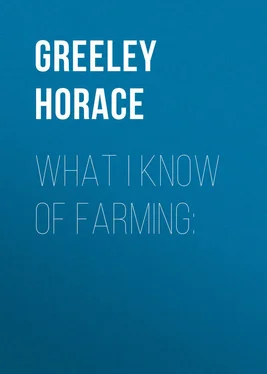Horace Greeley - What I know of farming:
Здесь есть возможность читать онлайн «Horace Greeley - What I know of farming:» — ознакомительный отрывок электронной книги совершенно бесплатно, а после прочтения отрывка купить полную версию. В некоторых случаях можно слушать аудио, скачать через торрент в формате fb2 и присутствует краткое содержание. Жанр: foreign_antique, foreign_prose, foreign_language, на английском языке. Описание произведения, (предисловие) а так же отзывы посетителей доступны на портале библиотеки ЛибКат.
- Название:What I know of farming:
- Автор:
- Жанр:
- Год:неизвестен
- ISBN:нет данных
- Рейтинг книги:4 / 5. Голосов: 1
-
Избранное:Добавить в избранное
- Отзывы:
-
Ваша оценка:
- 80
- 1
- 2
- 3
- 4
- 5
What I know of farming:: краткое содержание, описание и аннотация
Предлагаем к чтению аннотацию, описание, краткое содержание или предисловие (зависит от того, что написал сам автор книги «What I know of farming:»). Если вы не нашли необходимую информацию о книге — напишите в комментариях, мы постараемся отыскать её.
What I know of farming: — читать онлайн ознакомительный отрывок
Ниже представлен текст книги, разбитый по страницам. Система сохранения места последней прочитанной страницы, позволяет с удобством читать онлайн бесплатно книгу «What I know of farming:», без необходимости каждый раз заново искать на чём Вы остановились. Поставьте закладку, и сможете в любой момент перейти на страницу, на которой закончили чтение.
Интервал:
Закладка:
You can hardly have a pasture so small that it will not afford hospitality to weeds and prove a source of multiform infestations. The plants that should mature and be diffused will be kept down to the earth; those which should be warred upon and eradicated will flourish untouched, ripen their seed, and diffuse it far and wide. Thistles, White Daisy, and every plant that impedes tillage and diminishes crops, are nourished and diffused by means of pastures.
I hold, therefore, that the good farmer will run a mowing-machine over his pasture twice each Summer – say early in June, and then late in July – or, if his lot be too rough for this, will have it clipped at least once with a scythe. Cutting all manner of worthless if not noxious plants in the blossom, will benefit the soil which their seeding would tax; it will render the eradication of weeds from your tillage a far easier task; and it will prevent your being a nuisance to your neighbors. I am confident that no one who has formed the habit of keeping down the weeds in his pasture will ever abandon it.
I think each pasture should have (though mine, as yet, has not) a rude shed or other shelter whereto the cattle may resort in case of storm or other inclemency. How much they shrink as well as suffer from one cold, pelting rain, few fully realize; but I am sure that "the merciful man" who (as the Scripture says) "is merciful to his beast," finds his humanity a good paying investment. I doubt that the rule would fail, even in Texas; but I am contemplating civilized husbandry, not the rude conditions of tropical semi-barbarism. If only by means of stakes and straw, give cattle a chance to keep dry and warm when they must otherwise shiver through a rainy, windy day and night on the cold, wet ground, and I am sure they will pay for it.
In confining a herd of cattle to such narrow limits, I do not intend that they shall be stinted to what grows there. On the contrary, I expect them to be fed on Winter Rye, on Cut Grass, on Sowed Corn, Sorghum, Stalks, Roots, etc., etc., as each shall be in season. With a good mower, it is a light hour's work before breakfast to cut and cart to a dozen or twenty head as much grass or corn as they will eat during the day. But let that point stand over for the present.
VII.
TREES – WOODLAND – FORESTS
I am not at all sentimental – much less mawkish – regarding the destruction of trees. Descended from several generations of timber-cutters (for my paternal ancestors came to America in 1640), and myself engaged for three years in land-clearing, I realize that trees exist for use rather than for ornament, and have no more scruple as to cutting timber in a forest than as to cutting grass in a meadow. Utility is the reason and end of all vegetable growth – of a hickory's no less than a corn-stalk's. I have always considered "Woodman, spare that tree," just about the most mawkish bit of badly versified prose in our language, and never could guess how it should touch the sensibilities of any one. Understand, then, that I urge the planting of trees mainly because I believe it will pay , and the preservation, improvement, and extension, of forests, for precisely that reason.
Yet I am not insensible to the beauty and grace lent by woods, and groves, and clumps or rows of trees, to the landscape they diversify. I feel the force of Emerson's averment, that "Beauty is its own excuse for being," and know that a homestead embowered in, belted by, stately, graceful elms, maples, and evergreens, is really worth more, and will sell for more, than if it were naked field and meadow. I consider it one positive advantage (to balance many disadvantages) of our rocky, hilly, rugged Eastern country, that it will never, in all probability, be so denuded of forests as the rich, facile prairies and swales of the Great Valley may be. Our winds are less piercing, our tornadoes less destructive, than those of the Great West. I doubt whether there is another equal area of the earth's surface whereon so many kinds of valuable trees grow spontaneously and rapidly, defying eradication, as throughout New England and on either slope of the Alleghenies; and this profusion of timber and foliage may well atone for, or may be fairly weighed against, many deficiencies and drawbacks. The Yankee, who has been accustomed to see trees spring up spontaneously wherever they were not kept down by ax, or plow, or scythe, and to cross running water every half mile of a Summer day's journey, may well be made homesick, by two thousand miles of naked, dusty, wind-swept Plains, whereon he finds no water for fifty to a hundred miles, and knows it impossible to cut an ax-helve, much more an axle-tree, in the course of a wearying journey. No Eastern farmer ever realized the blessedness of abundant and excellent wood and water until he had wandered far from his boyhood's home.
No one may yet be able fully to explain the inter-dependence of these two blessings; but the fact remains. All over "the Plains," there is evidence that trees grew and flourished where none are now found, and that springs and streams were then frequent and abiding where none now exist. A prominent citizen of Nevada, who explored southward from Austin to the Colorado, assured me that his party traveled for days in the bed of what had once been a considerable river, but in which it was evident that no water had flowed for years. And I have heard that since the Mormons have planted trees over considerable sections of Utah, rains in Summer are no longer rare, and Salt Lake evinces, by a constant though moderate increase of her volume of waters, that the equilibrium of rain-fall with evaporation in the Great Basin has been fully restored – or rather, that the rain-fall is now taking the lead.
I have a firm faith that all the great deserts of the Temperate and Torrid Zones will yet be reclaimed by irrigation and tree-planting. The bill which Congress did not pass, nor really consider, whereby it was proposed, some years since, to give a section of the woodless Public Lands remote from settlement to every one who, in a separate township, would plant and cherish a quarter-section of choice forest-trees, ought to have been passed – with modifications, perhaps, but preserving the central idea. Had ten thousand quarter-sections, in so many different townships of the Plains, been thus planted to timber ten to twenty years ago, and protected from fire and devastation till now, the value of those Plains for settlement would have been nearly or quite doubled.
A capital mistake, it seems to me, is being made by some of the dairy farmers of our own State. One who has a hundred acres of good soil, whereof twenty or thirty are wooded, cuts off his timber entirely, calculating that the additional grass that he may grow in its stead will pay for all the coal he needs for fuel, so that he will make a net gain of the time he has hitherto devoted each Winter to cutting and hauling wood. He does not consider how much his soil will lose in Summer moisture, how his springs and runnels will be dried up, nor how the sweep of harsh winds will be intensified, by baring his hill-tops and ravines to sun and breeze so utterly. In my deliberate judgment, a farm of one hundred acres will yield more feed, with far greater uniformity of product from year to year, if twenty acres of its ridge-crests, ravine-sides, and rocky places, are thickly covered with timber, than if it be swept clean of trees and all devoted to grass. Hence, I insist that the farmer who sweeps off his wood and resolves to depend on coal for fuel, hoping to increase permanently the product of his dairy, makes a sad miscalculation.
Spain, Italy, and portions of France, are now suffering from the improvidence that devoured their forests, leaving the future to take care of itself. I presume the great empires of antiquity suffered from the same folly, though to a much greater extent. The remains of now extinct races who formerly peopled and tilled the central valleys of this continent, and especially the Territory of Arizona, probably bear witness to a similar recklessness, which is paralleled by our fathers' and our own extermination of the magnificent forests of White Pine which, barely a century ago, covered so large a portion of the soil of our Northern States. Vermont sold White Pine abundantly to England through Canada within my day: she is now supplying her own wants from Canada at a cost of not less than five times the price she sold for; and she will be paying still higher rates before the close of this century. I entreat our farmers not to preserve every tree, good, bad, or indifferent, that may happen to be growing on their lands – but, outside of the limited districts wherein the primitive forest must still be cut away in order that land may be obtained for cultivation, to plant and rear at least two better trees for every one they may be impelled to cut down . How this may, in the average, be most judiciously done, I will try to indicate in the succeeding chapter.
Читать дальшеИнтервал:
Закладка:
Похожие книги на «What I know of farming:»
Представляем Вашему вниманию похожие книги на «What I know of farming:» списком для выбора. Мы отобрали схожую по названию и смыслу литературу в надежде предоставить читателям больше вариантов отыскать новые, интересные, ещё непрочитанные произведения.
Обсуждение, отзывы о книге «What I know of farming:» и просто собственные мнения читателей. Оставьте ваши комментарии, напишите, что Вы думаете о произведении, его смысле или главных героях. Укажите что конкретно понравилось, а что нет, и почему Вы так считаете.












